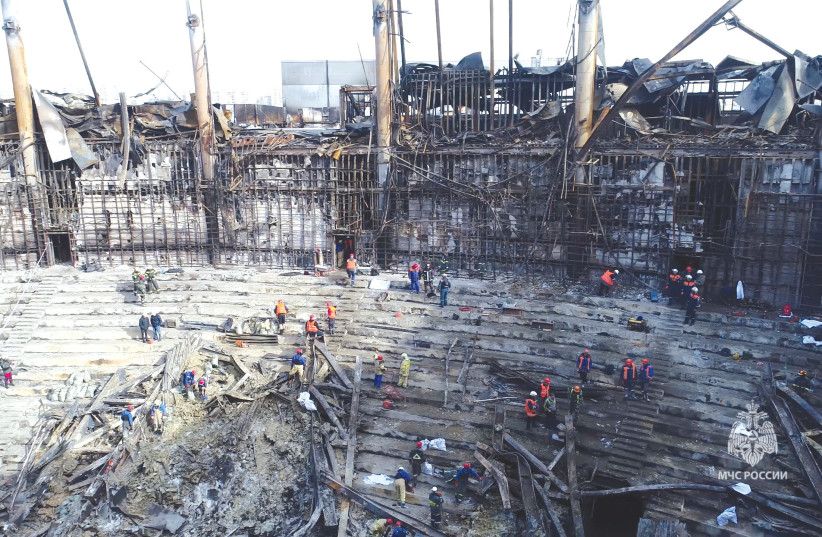Terrorism cannot be overlooked on the list of challenges facing the world.
A new generation of organizations is spreading in different regions. However, the recent devastating attack by four gunmen on the Crocus City Hall, near Moscow, has attracted a great deal of attention. The high level of bloodshed and violence, reminiscent of the massacre carried out by the Hamas terrorist group on October 7, is clearly visible in the footage of the killings in this incident, highlighting the brutality of the perpetrators. At the same time, the question arises of how the perpetrators were able to escape immediately after their crime.
The attack, claimed by Khorasan Daesh (Islamic State – Khorasan Province) in Russia is an escalation in terrorist activity and raises many questions about the true perpetrators and the timing of the criminal action, preceded by the US embassy in Moscow’s warnings of a possible act of terrorism.
The gruesome attack, which killed and injured dozens of people in Russia, is one of the few terrorist crimes that have sparked widespread controversy over the identity of the real mastermind, despite Khorasan Daesh’s announcement that it had carried out the action. One of the reasons for this doubt has to do with the circumstances. The situation is becoming increasingly complicated as international accusations and suspicions mount and the US keeps asserting the innocence of Ukraine, accused immediately after the incident, adding to the speculation and controversy.
On March 7, the US embassy in Moscow said it was investigating reports that extremists were planning attacks on gathering places in Moscow, including music concerts, and advised US citizens to stay away from large gatherings of people “for the next 48 hours,” information that Russian security authorities said they had also received, without providing details.

These warnings are the reason some observers suspect the possibility of Western involvement in the Moscow attack. It must be said, however, that Western embassies issue many of these alerts at different times and in different countries, based on information from intelligence circles, few of which are accurate and most of which are conclusions and cautions based on information monitored by those circles.
It is not always easy to draw conclusions from these warnings. They are similar to the warnings Israel received before the brutal attack by the Hamas terror group on October 7, which were not taken seriously by Israeli intelligence circles, leading to a catastrophe whose effects are still reverberating in Gaza and a crisis that has the region and the world searching for a way out.
The role of sharing intelligence
Intelligence information shared between specialized agencies in the context of international and bilateral counterterrorism cooperation does not include the monitoring of detailed information leading to the development of prevention plans. However, it may involve small information indicators that draw attention to a particular direction or thread that requires further investigative and preventive action, to thwart major terrorist offenses.
US sources have confirmed that this information, in addition to the public warning to Americans in Russia, was provided to Russian authorities under the long-standing mandatory warning policy, and the relevant security authorities have confirmed that they received information from the US side about the preparation of a terrorist attack. However, this was general information without details.
On the other hand, doubts are circulating in some media and social networks as to whether the Crocus City operation was a dubious attempt to divert attention from developments on the Ukrainian front, where Russia is making significant military advances, suggesting that the West may have had a hand in it. These doubts will remain until the Russian security authorities receive conclusive information about the real motives for the operation and the party that carried it out.
There’s no need for political or security analysis, just reliable information to establish the truth. It is even dangerous to jump to analytical conclusions based on linking circumstances or the sequence of events that may have no meaningful connection, such as the claim that the operation took place a few hours after the use of the Russian veto against an American decision in the Security Council on Gaza, a rash connection to make.
Planning such crimes requires long periods of time. It is not like someone just pushes a button and these terrorist criminals then go on to spill the blood of such a large number of innocent people.
Some say that Russia may not be revealing the truth about the party that carried out the operation and is instead framing the attack as part of the Ukraine crisis. Again, these are legitimate conjectures in the world of politics and cannot be ruled out. In all cases, however, these terrorist crimes require genuine international cooperation and should not be used to settle disputes between major countries and powers.
The terrorist threat excludes no one. In such a complex dossier, there must be no confusion of the situation and no settling of accounts. It is not about whether or not there are undeclared links between terrorist organizations and intelligence services, as some keep claiming in such cases. The whole scene is determined by confirmed information and not by analytical conclusions based on a politically motivated conjuncture.
Khorasan Daesh, which claimed responsibility for the operation in Moscow – as well as other Daesh [Islamic State] terrorist groups – continues to pose a major threat, whether they commit their crimes as part of a specific ideological agenda or for other reasons.
The world must pay attention to further warnings that are being issued in connection with various crises, amid the spread of terror and the possible emergence of new generations of terrorists who are even bloodier and more cruel.
The writer is a UAE political analyst and former Federal National Council candidate.
